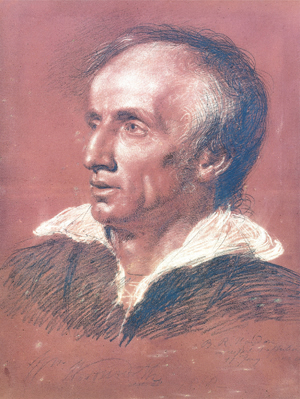
William Wordsworth (1770–1850) by Benjamin Robert Haydon, 1818
On 7 April 1770 William Wordsworth was born into a relatively affluent family that lived in the grandest house in the main street of Cockermouth, a small town in Cumberland. His father, John Wordsworth, worked as the legal agent for Sir James Lowther, subsequently the Earl of Lonsdale. Wordsworth’s early years, however, were marked by tragedy: in 1778 his mother, Ann, died of pneumonia; five years later, in 1783, his father died also. These events naturally had a devastating impact on the Wordsworth siblings. For the next nine years William was separated from his sister, Dorothy. She was sent to live with relatives in Halifax, whilst William was enrolled at Hawkshead Grammar School in Furness. Nonetheless, William enjoyed an excellent education as a schoolboy. In 1787 he went up to St John’s College, Cambridge, and it was here that he took a great interest in the course of the French Revolution. Consequently, in the summer of 1790, he set out on a walking tour of France with a college friend, Robert Jones. He returned to France the following year and fell in love with Annette Vallon, who gave birth to his daughter, Caroline Wordsworth, in December 1792. Wordsworth, however, had returned to England in an attempt, it seems, to publish two early poems, An Evening Walk and Descriptive Sketches. As a result of the execution of Louis XVI and the subsequent outbreak of war it became impossible for him to return to France at that time. It was during this period that Wordsworth composed A Letter to the Bishop of Llandaff, a pamphlet in defence of regicide which remained unpublished throughout his lifetime. He also became a fervent admirer of William Godwin’s optimistic treatise, Political Justice, although he subsequently became deeply disillusioned with Godwinian rationalism.
In 1794 he was reunited with Dorothy. They lived together for a short time at Keswick before moving to Racedown Lodge in Dorset in 1795; then, in July 1797, they moved to Alfoxden House in Somerset to be near to Samuel Taylor Coleridge, who was residing in Nether Stowey. During this time, under the combined influence of Dorothy and Coleridge, Wordsworth composed much of his greatest work. Here he composed Lyrical Ballads and began work on The Prelude, the thirteen-book autobiographical epic poem that remained unpublished until Wordsworth’s death in 1850. The Prelude, however, was conceived as part of a much larger philosophical poem called The Recluse, which was never completed, although numerous fragments of it survive.
In the summer of 1798 Wordsworth, Dorothy and Coleridge set out for Germany where William intended to set to work on The Recluse. It was here that an early two-part version of The Prelude was completed. Wordsworth and his sister returned from Germany in the spring of 1799 and, by the end of the year, had moved into a cottage (subsequently named Dove Cottage) at Town End in Grasmere, which was to be their home for the next eight years. Here Wordsworth settled into family life, marrying Mary Hutchinson in 1802. By this time, Coleridge had moved with his family to Greta Hall in Keswick; in 1803, Robert Southey moved to the area also. The period 1797 to 1807 came to be known as Wordsworth’s ‘Great Decade’. Nonetheless, he continued to write prolifically until his death and considered his greatest poem to be The Excursion, published in 1814. Although in the early 1800s much of his poetry was misunderstood and even ridiculed, his stature rose steadily as he came to be seen as the progenitor of a new generation of poets. In 1843 he was appointed Poet Laureate and, in his later years, was awarded honorary degrees from the universities of Durham and Oxford. He died on 23 April 1850 at Rydal Mount and was buried four days later at St Oswald’s in Grasmere. The Prelude, perhaps his greatest poem, was published three months later.